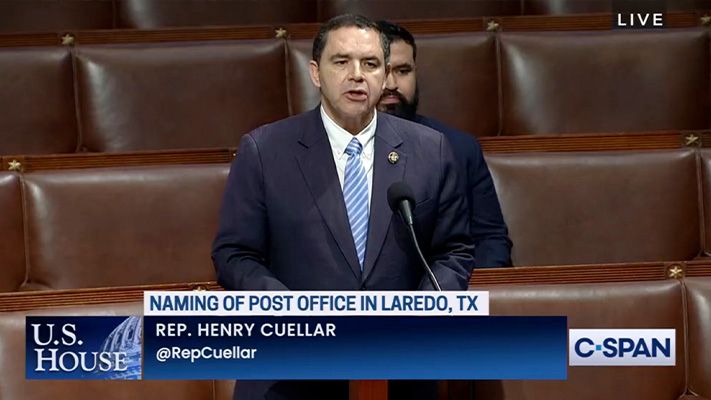
Guy Rose got national attention because he made faces in the House chamber. The 6-year-old accompanied his father, Rep. John Rose (R-TN), to work and sat in the background when the three-term Tennessee Republican spoke on the House floor. While his father was defending former President Donald Trump, Guy mugged for the cameras enough that he became the family’s cable news sensation for a day.
Young Guy Rose wasn’t alone. Perched far above him in the press gallery, often spending hours sitting alone by myself, I couldn’t help but make faces, too.

For all the coverage of Capitol Hill, the furious gaggles of reporters surrounding the usual handful of members who have become cable news stars, the all capital-letter SCOOPS of glorified press releases, and the banal drama where legislators almost annually flirt with political and economic catastrophe yet seemingly always avoid going over the precipice — there’s very little about what happens inside the House chamber.
The actual process of legislation is often ignored, and the debate on the floor is not even an afterthought. For hours, reporters ignore the chamber and it’s left to tourists, government functionaries, and, of course, whoever happens to be speaking.
No one pays attention, save the stenographers furiously transcribing for the Congressional Record and the handful of viewers on C-Span. But what if someone did? That was the concept that prompted me to spend a week in the House chamber. I was convinced that there would be something of value, loose diamonds left to be unearthed. I thought not just of the stylists who write parliamentary sketches in Westminster but of H.L. Mencken’s famous description of sitting through political conventions:
“One sits through long sessions wishing heartily that all the delegates and alternates were dead and in hell — and then suddenly there comes a show so gaudy and hilarious, so melodramatic and obscene, so unimaginably exhilarating and preposterous that one lives a gorgeous year in an hour.”
I spent the whole week sitting in the House press gallery. From the moment that the chamber was gaveled in each morning to when there was finally the motion to adjourn in the evening, I was there every moment. And I’m still waiting to live that gorgeous year.
Bringing down the gavel
The start of the congressional day is filled with a mundane ritual that mixes the 20th century and the 18th. Before the session starts, office equipment and binders are taken out of desks and the now exotic whirl of a pencil sharpener can be heard in the background. One clerk puts on gloves to take a silver inkstand out of a drawer and place it onto the speaker’s rostrum. A member or two lingers around in the chamber, getting directions on what to do when the House is called to order. And then, eventually, a ceremonial silver mace is brought into the chamber and the day begins.
Rose’s remarks, wedged between a celebration of the latest inductees to the Greater Savannah Athletic Hall of Fame and a complaint about President Joe Biden’s border policy, were only memorable for his sidekick. After all, his colleague Rep. Tom McClintock (R-CA) had only just delivered a far spicier defense of Trump that compared him to both Nelson Mandela and Sir Thomas More. But the prospect of starting the week with a redheaded child making silly faces while waving around a rubber toy seemed to promise greater entertainment once the real lawmaking began. The problem, though, was the real legislation that day mostly consisted of naming post offices.
Mailing it in
In fact, on Monday, Congress named over two dozen post offices. They were named for an eclectic array of people, some living, most dead. There were soldiers who died in combat, longtime post office employees, and, of course, Johnny Cash. They all would be memorialized through an often pro forma process in which the sponsor of the bill would speak about the importance of the person about to be immortalized by the United States Postal Service. If the sponsor was a Democrat, the Republican managing this on the floor, Rep. Glenn Grothman (R-WI), would offer a few additional words. If the sponsor was a Republican, Grothman’s counterpart, Rep. Jamie Raskin (D-MD), would speak. It was a mechanical process that happened mostly by rote. The only interruption was when Grothman went too fully on autopilot, and there was a brief moment when he asked that “all members have five legislative days to revise and extend their remarks” before the House had agreed to consider a bill to name a post office in Glendale, California, after former Navy Secretary Paul Ignatius.

This went on and on and on. Finally, after hours of debate, the reserve of unnamed post offices had finally been emptied for the day and time for votes to be cast. First, Congress would vote on a resolution condemning antisemitism and recognizing the contributions of the Jewish American community. Then there would be a vote to name the post office in Lakeland, Georgia, after Nell Patten Roquemore, a former postmaster and longtime community leader. The second vote simply enabled there to be a pause for the swearing-in ceremony of Vince Fong, a newly elected member of Congress to the seat vacated by former House Speaker Kevin McCarthy’s resignation. There would be a ceremony and a brief speech, and then Fong would get to celebrate the culmination of months of campaigning and decades in politics by voting on the name of the a post office in rural south Georgia.
After the votes, there were even more speeches. The first were one-minute speeches, which provided members with 60 seconds in the well of the House to opine on the topic of their choice. These ranged from Rep. G.T. Thompson (R-PA) celebrating National Fishing and Boating Week to Rep. Donald Norcross (D-NJ) expressing his solidarity with the South Jersey Sikh community. Finally, it was time for special order speeches, in which members are given 60 minutes apiece for whatever topics move them. It’s a free-flowing process in which others can participate and even lends itself to actual dialogue on the House floor. Monday’s installment of this was Republicans remembering the anniversary of D-Day by reading first-person accounts from those who served and the Congressional Black Caucus taking an hour to talk about foster care in the U.S.
It all finally ended at 9 p.m. There weren’t even tourists in the House chamber, and the Capitol was already dim and empty for the day. The next day held the promise of being more entertaining. After all, it couldn’t be more tedious than watching post offices be named.
After going postal
Events resumed at 9 a.m. the next day with the same rigamarole as the day before. The Pledge of Allegiance was said, and the first round of speeches was given. Tuesday’s morning hour felt much like a newspaper obituary section come to life as members of Congress spent much of it paying tribute to recently deceased constituents, including a Marine who died in a training accident and the CEO who created the Cowboy Channel on digital television.

Then it became time for the day’s legislating. The first bill to be considered was legislation to impose sanctions on the International Criminal Court in The Hague for its decision to indict top Israeli officials for actions taken in the war against Hamas.
The bill itself wasn’t being debated at first. Instead, there was a discussion of “the rule” to debate it, as well as an appropriations bill to fund the Department of Veterans Affairs and military construction, which was also on the docket for the week. The rule is the method by which terms of debate are set on the floor of the House. There is an entire committee, called, of course, the Rules Committee, that serves as the traffic officer and decrees how long a bill can be debated on the floor and what, if any, amendments are allowed.
The debate over the rule focused little on the underlying substance of the bill but instead simply on procedure. The top Democrat on the committee, Rep. Jim McGovern (D-MA), insisted that Republicans were treating the process with contempt and simply trying to steamroll legislation through. “My Republican colleagues are turning this into a joke, a complete and total mockery of the committee process,” McGovern said. His counterpart, Rep. Guy Reschenthaler (R-PA), said Democrats were worse when they were in the majority and repeatedly insisted he was being “gaslit.” At the end of the heated debate, Reschenthaler went over to joke with McGovern. They shook hands and had a pleasant conversation as it was time to vote on the rule.

The House floor during a vote has its own dynamics. The first vote is always supposed to last 15 minutes to give members enough time to drop what they are doing and come to the floor of the House. Invariably, it lasts at least half an hour. As members start to trickle into the chamber, they take their voting cards out of their wallets and find voting machines on the aisles of the chamber and cast their votes. They often look up at the projection shown on the wall in the front of the chamber, behind the press gallery, to see who voted and how. Then they all start to mix. There is a certain formula to the conversations as members mill about. It’s not often that a Democrat goes to the Republican side of the chamber or vice versa. It happens just enough to be unremarkable yet noticeable. There are usual cliques that form. The most conservative element of the Republican Conference sits around the center aisle in the rear of the chamber. There are clusters scattered throughout where one normally finds centrist Republicans, members of the Congressional Black Caucus, Texas Republicans, and California Democrats. Members mix and mingle. There are brief conversations, back slaps, and hugs. Some simply sit by themselves and play with their phones. It is all a constant churn. Perhaps if all members of Congress were tagged like migratory birds, the patterns would reveal great insights about American politics and how Congress works. At the very least, it would produce a doctoral thesis that might get someone a tenure-track job even in this job market. However, with the expulsion of George Santos, it’s unlikely that any member of Congress will be permanently attached to an ankle monitor any time soon.
The vote finally ended, and it was now time for substantive debate. First, there was the ICC bill. Almost everyone agreed that the court’s decision to bring charges against Israeli Prime Minister Benjamin Netanyahu and Defense Minister Yoav Gallant was “clearly outrageous,” in the words of Rep. Gregory Meeks (D-NY), the ranking member on the House Foreign Affairs Committee. The question was whether this bill was the right way to address it. On this there seemed to be bipartisan consensus, too. Rep. Mike McCaul (R-TX), the chairman of the House Foreign Affairs Committee, acknowledged that the legislation being voted on was a political ploy that would go nowhere. “A partisan messaging bill was not my intention here, nor was it Mr. Meeks’s intention, but that’s where we are right now,” he said. McCaul blamed the Biden White House for pulling “a 180” for this but expressed the hope that “we can still get back to a bipartisan bill.” The debate eventually ended, and the bill eventually overwhelmingly passed. Forty-two Democrats voted for it, while no Republicans voted against it, though two voted present.
Once that ended, it was time to bring up the appropriations bill. The effect in the chamber was like a shift change in hockey. The members and staff handling the Israel bill left, and those dealing with spending for veterans and military construction came in, with the staffers lugging broad folders of documents to deal with the multitude of amendments being offered.
This had to be exciting. Appropriations bills are where the action should be in the House. The way Congress is supposed to work is that all federal spending comes from 12 annual appropriations bills every year. However, Congress stopped working a while ago. Instead, this appropriations bill, traditionally one of the least controversial, was yet another place for culture war fights. The debate initially focused on those, all of which would likely be stripped in the Democratic-controlled Senate if it even bothered to consider an individual appropriations bill, before amendment after amendment was offered to the underlying legislation.
Most of the amendments were uncontroversial. This wasn’t because they were bipartisan or contained proposals of such blinding common sense that no one could argue with them. Instead, it was because they didn’t do anything. There was amendment after amendment to increase funding and then decrease it by the same amount in order to send various messages to the VA, such as the importance of providing more housing and better mental healthcare for veterans. There was the same repetitive routine with the Democrat managing the bill, Rep. Debbie Wasserman Schultz (D-FL), prefacing all her remarks by saying she “claimed time in opposition but not oppose” before each amendment passed without a recorded vote.
This caused some confusion when Rep. August Pfluger (R-TX) took exception to her repeating this formula after his amendment to increase funding and then decrease it to encourage the VA to study cancer exposures for military aviators. He offered this amendment and then turned aside to chat with a colleague, paying little attention to Wasserman Schultz, who expressed her support for the amendment as a cancer survivor. Pfluger then rose up to express his surprise that there was opposition. Wasserman Schultz then explained the procedural formula to the second-term Republican, who was relieved and simply said “very good” with a thin smile.
Even some amendments that actually did things did nothing. Instead, they were minor skirmishes in the culture war, such as an amendment to keep the VA from using any funds to take down the iconic Alfred Eisenstaedt photograph V-J Day in Times Square of a sailor grabbing a woman and kissing her and another prohibiting the agency from updating gendered language in its motto originally from an Abraham Lincoln quote.
Up for debate
Then the votes happened again. They piled one onto another under mostly predictable lines. The one moment of excitement happened on an amendment offered by Rep. Brian Mast (R-FL) to enable veterans to get access to medical marijuana. Some Democrats had voted against it at first amid a long series of partisan votes (other amendments included the latest installment of Rep. Marjorie Taylor Greene’s (R-GA) crusade against U.S. membership of NATO, which she described as “undermining the security of our nation,” and an effort by Rep. Eli Crane (R-AZ) to make it easier for veterans adjudged “mentally incompetent” to buy guns). Then there was a last-minute scramble to change their votes when they realized they actually supported the legislation. There were yells to keep the vote open as members rushed to fill out the green cards to change their vote. Not all of them were paying attention. Afterward, at least one Democrat, Rep. Ritchie Torres (D-NY), posted that he had voted against the amendment by accident.
But by the time that he had put out the statement, the votes were long over and the speeches were going on and on and on. After the usual tributes to retirees and moments for members to share the thoughts that cable news bookers wouldn’t let them share on networks with a more expansive viewership than C-Span, it was time for a whole new round of special orders, two hours’ worth in fact.
This included a regular installment of speeches from Rep. David Schweikert (R-AZ) warning about the national debt. This was followed by a two-man show with Reps. Chip Roy (R-TX) and Scott Perry (R-PA) going back and forth to complain about the policies of Biden and the Left, which had both led to an “invasion” of the southern border and made it more expensive for Roy to replace his car’s windshield. It culminated with freshman Rep. Kevin Kiley (R-CA) using the time to give a series of smaller speeches. He got to share his thoughts on a variety of topics ranging from artificial intelligence to high-speed rail before getting to induct a number of local police officers in his district to the “2024 Third Congressional District Police Honor Roll.”
Quitting time
The same process began again on Wednesday morning. It felt a bit like a repetition of the day before. There was the same pledge, the same morning hour speeches — Rep. Russ Fulcher (R-ID) warned about the threat on the northern border, while Rep. Don Davis (D-ND) talked about the “sound of freedom” emanating from an Air Force base in his district — and then the same dreary amendments to increase funding and then decrease by the same amount, followed by Wasserman Schultz rising once again “to claim time in opposition but not to oppose.”
Eventually, the final votes happened. The bill passed, and members rushed for the exits. Over 50 were headed to Normandy for the 80th anniversary of D-Day. Others were simply headed home. There was one more round of speeches. Rep. John Rutherford (R-FL) had to pay tribute to Swisher, the company that makes Swisher Sweets, Rep. Dan Meuser (R-PA) had to condemn the abuse of the justice system that Trump was facing, and Rep. Melanie Stansbury (D-NM) had to share the insight that “in New Mexico, we say water is life.” Finally, Rep. Ro Khanna (D-CA) compared the U.S. administering Puerto Rico as a commonwealth to the British Empire administering India as a viceroyalty before Congress called it a week before noon on a Wednesday.
It’s possible I picked a slow week. Perhaps if I sat through another week, I would witness important and substantive things happening. I doubt it, though. Instead, it often felt like I was watching a political pantomime as members acted out the forms of a procedure adopted for a different era of politics. At a time when few, if any, bills are able to be freely amended on the floor, much of the debate felt like archaic formalities carried out for tradition’s sake. No one was persuaded because no one was even there listening. As for the rest, it just felt like fodder to be hopefully clipped for local news, not to mention what Roy described as “72 people watching on C-Span” and, of course, myself sitting alone in the press gallery.
But then again, if no one is watching, it’s rational for members to treat what happens on the floor of the House as an afterthought. It’s not as if we live in a world in which oratorical ability or debating skills have been devalued, but the fora where members of Congress are supposed to display their virtuosity is on cable news, not in the well of the House.
CLICK HERE TO READ MORE FROM THE WASHINGTON EXAMINER
It wasn’t always like this. After all, the chamber is designed for people to watch the spectacle on the floor. There are clear sight lines, and sound carries — indeed, the building was built long before the invention of the microphone.
The question is whether any of this would change if more people were paying attention. If more reporters braved the unrelenting grind of post office namings and symbolic amendments, would more members take what happened in the House chamber more seriously? It’s quite possible. But after last week, I’m not volunteering to do it.
Ben Jacobs is a writer based in Washington, D.C.
Scroll down to leave a comment:







